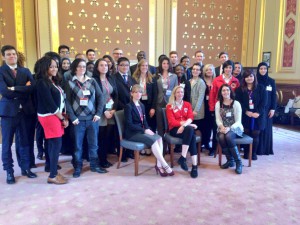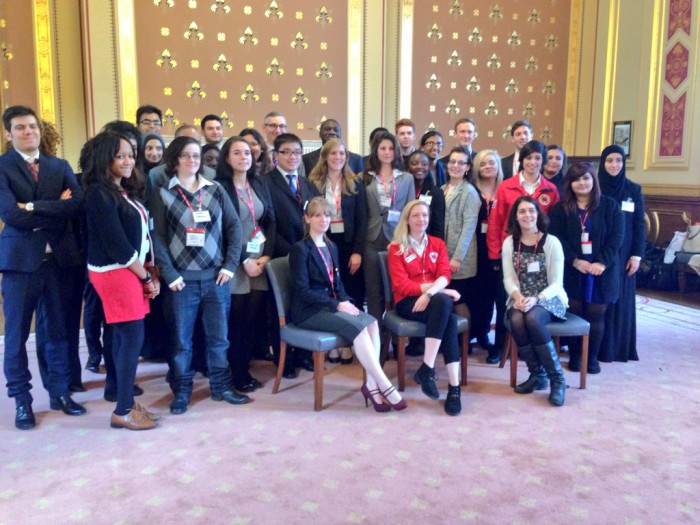
On 11 February, 2014, the Foreign and Commonwealth Office hosted students from the BCU School of Law and the FCO Youth Inspiration Group for a Model United Nations Security Council Session. The event provided invaluable experience in Security Council member state presentations, the political intricacies of alliance building at the multilateral level for session voting, and the vicissitudes of selecting the appropriate legal language for the formulation of a UNSC Resolution.
A Facebook page was created for the event, https://www.facebook.com/BCUMUN?ref=stream which provided information on the fictional scenario of the crisis in a created African country, “Ruritania,” supporting United Nations documents and relevant international relations materials. The Facebook page was the initial forum for the participants to build alliances with “like minded” governments, and for them to try to engage with governments who had contrasting political perspectives.
The Security Council speeches were held in the magnificent Locarno rooms. This gave the students a real sense of occasion. It was not lost on us that in the FCO at the same moment the British government was monitoring the situation in Syria. The participants played their roles in the spirit of professionalism with regards to their individual country prolife. The Heads of State and Foreign Ministers gave passionate and engaging speeches which spoke to their political sentiments and aspirations for dealing with the fictional crisis.
Following the speeches there were alliance building sessions and it quickly became evident that state compacts were forming; the EU countries, the African and Asian counties, and then Russia and the United States appeared to be “politically” isolated. We came together in the Entente Cordiale room and had a very lively discussion on the humanitarian and human rights issues for voting on for inclusion in a “Resolution on the Crisis in Ruritania.” The veto was only used once but it became difficult to achieve the required nine votes for many issues.
We identified limited sanctions, healthcare, and logistical issues for the inclusion into the resolution. Then the drafting process began. Here the participants experienced both the galvanising of alliances and the collapse of others. This intensified the focus on the language in the drafting of the resolution. In the heat of some of the discussions, the text shifted from producing defining obligations to enumerated aspirations. It was perhaps an accurate simulation of life in the United Nations Security Council.
Speakers at the event.
Everyone had a wonderful educational experience, not only of the UN, but also of the working of the Foreign and Commonwealth Office. We had the privilege of hearing talks by Ms. Sue Owen, Permanent Secretary, DCMA, who gave an engaging and inspiring address to women in the civil service, and provided cogent advice for achieving a gender balance in senior civil servant positions. Mr. Robert Hannigan, Director General for Defence and Security, explained some of the processes for collating information and the use of information to help protect British interests. He affirmed that the British government has a crucially important role in the global arena to help ensure peace and security. Then Ms. Melinda Simmons gave fantastic insights into the importance of international dialogue to help reduce domestic and international conflict. She spoke to the importance of cross-regional alliances in the United Nations, and the new role of the European External Action Service of the European Union for helping to maintain global peace.
Reflections
It was an extremely successful day, and post event feedback has been very positive. Mr. Lamiegha Brinemugha, an LLM in International Human Rights Law student has written a blog post on the event, revealing the significant educational value of the MUN, stating that it was a “dream come true,” http://jonyorkehumanrights.blogspot.co.uk/2014/03/the-fcobcu-model-united-nations.html . The Erasmus students, and the Youth Inspiration Group, have also been Tweeting and commenting on Facebook about how fantastic the event was. We also attracted members of the legal profession, including Birmingham solicitor, Mr Jimmy Ogunshakin.
Thanks
I must thank Mr. Christopher Layden, who I initially discussed the idea of an MUN at the FCO, and he was instrumental in helping organise the FCO/BCU event in 2013, http://jonyorkehumanrights.blogspot.co.uk/p/human-rights-education_22.html. Thanks also to Ms. Louise de Sousa, Head of the Human Rights and Democracy Department, who provided the logistical opportunities for both MUN events. Finally, thanks to Emily Farrow who organised the day, invited guest speakers, and made sure that everyone had a memorable experience at the FCO. We all did. It was an extremely successful collaborative event, and both the BCU students and the Youth Inspiration Group will always remember it.

